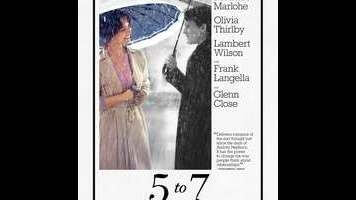5 To 7 is the prime time for romance, says this love story fit for primetime

The two hours spanning 5 to 7 p.m. have great meaning for the French. In Agnès Varda’s 1962 film Cléo From 5 To 7, the protagonist spends them anxiously waiting to hear whether or not she has cancer. Varda chose that particular time, however, for a reason: She meant to subvert a longtime Gallic notion that those are the carefree hours one spends with one’s lover, between getting off work and having to be home for dinner. Just such a cinq à sept affair, transplanted to the streets of New York, provides the basis of 5 To 7, an unabashedly sincere romance that could have been made back in the days when that expression was still current. (A Time magazine article in 1966 noted that “love in the afternoon” had supplanted it; the erotic hours had become 2 to 4 p.m. Maybe the pendulum has swung back, though.)
At first, struggling young writer Brian Bloom (Anton Yelchin) assumes that Arielle (Bérénice Marlohe), the French woman he awkwardly picked up while both were smoking outdoors, is unmarried, since she doesn’t wear a wedding ring. But after several platonic dates, she casually reveals that she has a husband, Valery (Lambert Wilson), who works as a diplomat, and two small children. Her relationship with Valery is an open one, however, and she’s perfectly free to take lovers, provided that she meet them only between 5 and 7 p.m.—no exceptions. Indeed, Valery has a lover of his own: a young woman named Jane (Olivia Thirlby), who, conveniently for Brian, happens to work in publishing. But Brian is more smitten with Arielle than he is professionally ambitious, and eventually he chafes at being forced into such a tiny window of her life. Arielle, too, confesses that she’s fallen in love with Brian, though that doesn’t necessarily mean that she’s prepared to walk away from her family in order to be with him.
5 To 7 was written and directed by Victor Levin, who was a regular writer for Mad About You back in the ’90s, and its central relationship has a sitcom-ish superficiality, heavy on light banter and lacking in any real passion. Consequently, efforts to create suspense about whether Arielle might leave her husband fall completely flat. The film is also guilty of badly overhyping Brian, who’s repeatedly assured that he’s an amazing writer and a spectacular lay—qualities that Yelchin’s earnest performance fail to suggest. However, Levin (whose only previous notable screenplay credit is the forgotten Kate Bosworth/Topher Grace comedy Win A Date With Tad Hamilton!) went on to write for Mad Men, and he’s absorbed some solid ideas from prestige drama to go with his glib sitcom instincts. The expected development in which Brian and Jane fall for each other never happens, and 5 To 7’s denouement is surprisingly poignant, acknowledging the way that certain key relationships can haunt us long after we’ve moved on with our lives. It’s a movie to be mildly enjoyed and then left behind—apropos, given the subject matter.